Is Beef Liver Safe to Eat
Beef liver is generally safe to eat when properly sourced, handled, and cooked. It's an exceptionally nutrient-dense food, rich in vitamins A, B12, iron, and copper. However, you should consume it in moderation due to its high vitamin A content, limiting intake to once or twice a week. To guarantee safety, purchase liver from reputable suppliers, cook it thoroughly to an internal temperature of 160°F (71°C), and practice good food hygiene. Pregnant individuals and those with health conditions should consult their healthcare providers before adding liver to their diet. By following proper guidelines, you can enjoy the nutritional benefits while minimizing potential risks.
This post may contain affiliate links. If you make a purchase through these links, I may earn a commission at no additional cost to you. Additionally, portions of this post may be generated using artificial intelligence (AI) technology. While we strive for accuracy, please be aware that AI-generated content may not always be perfect and should be fact-checked when necessary.
The Spatula Scoops
- Beef liver is generally safe to eat when properly sourced, handled, and cooked to an internal temperature of 160°F (71°C).
- Limit consumption to 3-4 ounces once or twice a week to avoid vitamin A toxicity and other potential risks.
- Choose organic, grass-fed beef liver from reputable suppliers to minimize exposure to contaminants and toxins.
- Pregnant individuals and those with health conditions should consult healthcare providers before consuming beef liver.
- Proper preparation, including thorough rinsing and removal of membranes, enhances safety and improves taste.
Nutritional Profile of Beef Liver
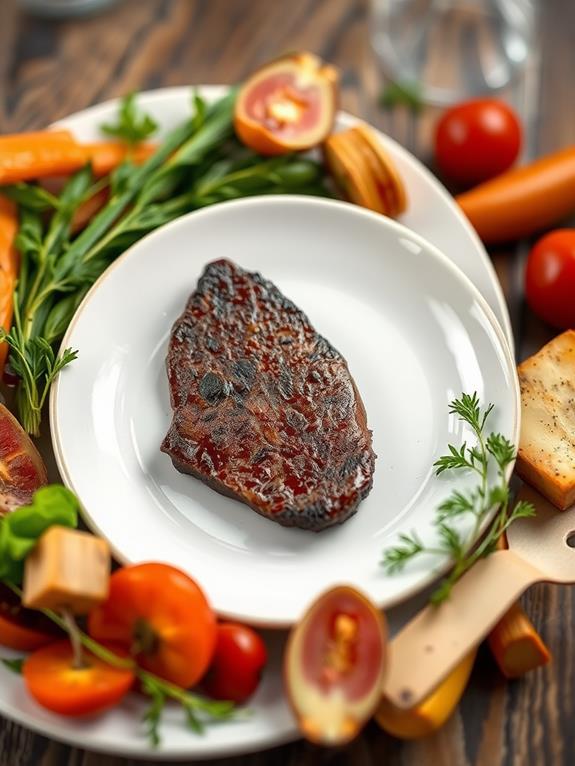
Beef liver packs a powerful nutritional punch. It's an incredibly nutrient-dense food, offering a wide array of vitamins and minerals in substantial quantities. You'll find it's particularly rich in vitamin A, which is essential for eye health and immune function; it is also similar to how quinoa provides numerous essential nutrients, making it a staple in various diets. A single 3-ounce serving provides more than 100% of your daily vitamin A needs, as well as nutritional benefits that can enhance overall health.
But that's not all. Beef liver is also an excellent source of vitamin B12, vital for nerve function and red blood cell formation. It contains high levels of iron, which helps prevent anemia, and copper, significant for collagen production. You'll also get a good dose of folate, riboflavin, and selenium.
Protein-wise, beef liver doesn't disappoint. It's a complete protein source, containing all essential amino acids your body needs. While it's lower in fat compared to muscle meat, it does contain some cholesterol. However, it's essential to mention that dietary cholesterol doesn't necessarily translate to increased blood cholesterol for most people.
Safety Considerations and Potential Risks
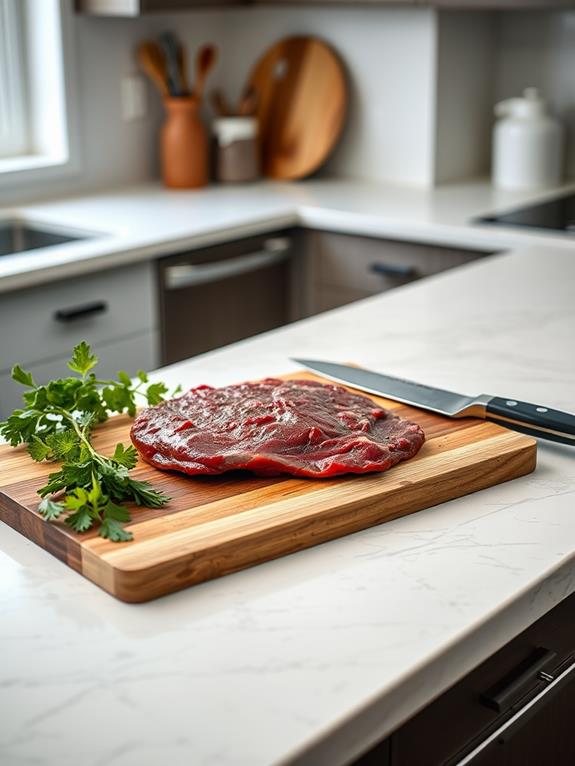
While generally safe for most people, there are three key safety considerations to keep in mind when consuming beef liver. First, it's important to be aware of its high vitamin A content. Excessive vitamin A intake can lead to toxicity, so you shouldn't consume beef liver more than once or twice a week. Moreover, following proper oxtail safety and handling guidelines promotes food safety, as similar principles apply to other meats. Second, there's a potential risk of foodborne illness if the liver isn't properly handled or cooked. Always verify it's thoroughly cooked to an internal temperature of 160°F (71°C) to eliminate harmful bacteria.
Lastly, beef liver may contain trace amounts of contaminants, such as heavy metals or pesticides. While regulatory bodies monitor these levels, it's prudent to source your liver from reputable suppliers. If you're pregnant or have certain health conditions, consult your healthcare provider before adding beef liver to your diet. Additionally, if you're taking medications, be aware that beef liver's high vitamin K content may interact with blood thinners. Always inform your doctor about significant dietary changes. By understanding these safety considerations and taking appropriate precautions, you can enjoy the nutritional benefits of beef liver while minimizing potential risks.
Sourcing and Quality Control
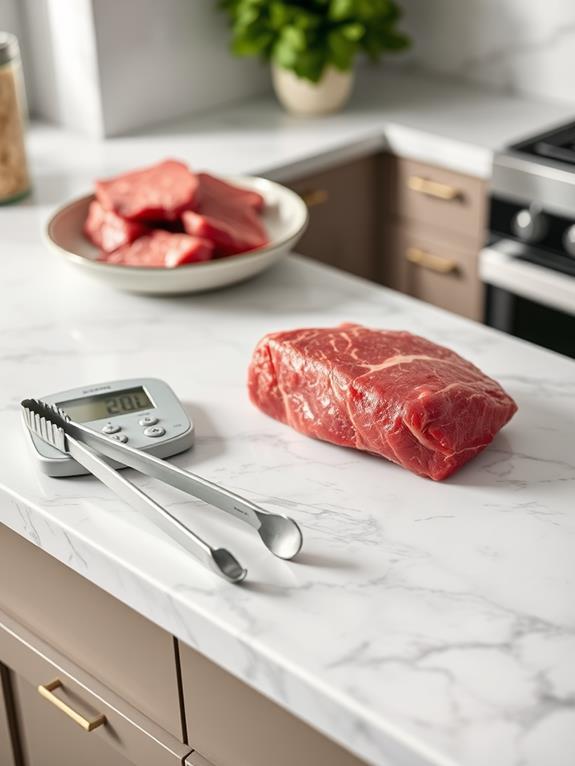
Consistently sourcing high-quality beef liver is essential for both safety and nutritional benefits. When purchasing beef liver, you'll want to prioritize organic, grass-fed options from reputable suppliers. These sources often implement stricter quality control measures, reducing the risk of contamination and guaranteeing higher nutrient content. Additionally, choosing products that are made from premium ingredients can enhance the overall health benefits of the liver you consume.
Look for liver with a deep, rich color and avoid any with discoloration or off-odors. Fresh liver should have a smooth, moist texture without any slimy residue. If you're buying from a local butcher, don't hesitate to ask about their sourcing practices and handling procedures.
For packaged liver, check the expiration date and confirm proper refrigeration. Many suppliers now use vacuum-sealed packaging, which can extend shelf life and maintain freshness. When storing liver at home, keep it in the coldest part of your refrigerator and use it within two days of purchase.
If you're concerned about potential toxins, consider researching the farm's practices regarding antibiotic use and environmental pollutants. By being diligent in your sourcing and quality control efforts, you'll maximize the safety and nutritional value of the beef liver you consume.
Recommended Consumption Guidelines
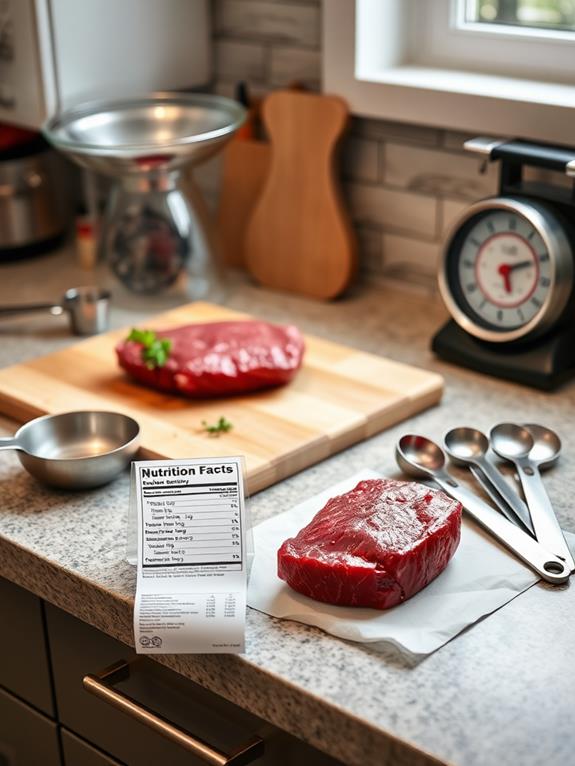
When it comes to incorporating beef liver into your diet, moderation is key. While liver is nutrient-dense, it's best to limit your intake to about 3 to 4 ounces per week. This serving size allows you to reap the benefits without risking overconsumption of certain nutrients, like vitamin A. It's essential to be aware of the health risks associated with high consumption of certain nutrients. You'll want to space out your liver meals throughout the week rather than consuming it all at once. If you're new to eating liver, start with smaller portions and gradually increase to the recommended amount. It's vital to mention that pregnant women should consult their healthcare provider before consuming liver due to its high vitamin A content.
When preparing beef liver, verify it's cooked thoroughly to an internal temperature of 160°F (71°C) to eliminate any potential foodborne pathogens. You can incorporate liver into your diet by adding it to stir-fries, making pâtés, or enjoying it as a standalone dish with onions. Remember, variety in your diet is significant, so don't rely solely on liver for your nutrient intake. Balance it with other protein sources and a wide range of fruits and vegetables for the best nutrition.
Preparation and Cooking Methods
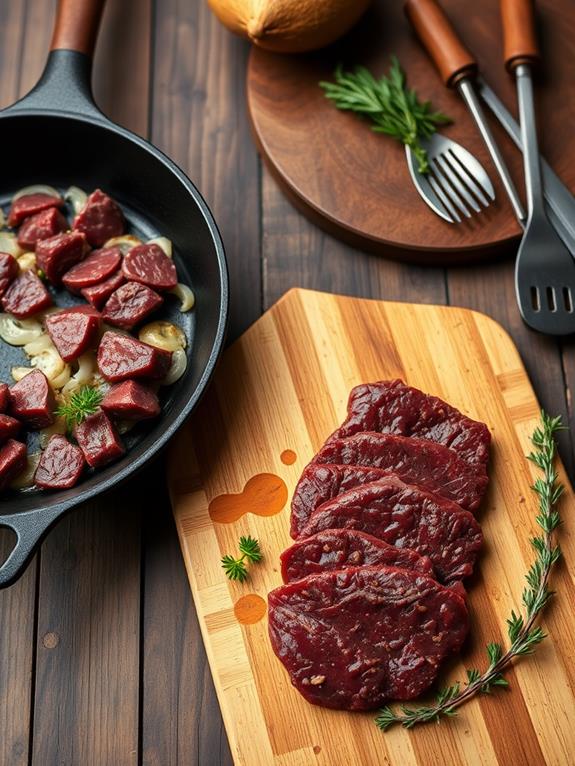
Preparation is key to enjoying beef liver safely and deliciously. Before cooking, you'll want to rinse the liver thoroughly and remove any visible membranes or connective tissue. Soaking the liver in milk for a few hours can help reduce its strong flavor, making it more palatable for those new to organ meats. You can utilize versatile cooking options such as air frying for a healthier preparation method that maintains the liver's tenderness.
When it comes to cooking methods, you've got several options. Pan-frying is a popular choice: simply dredge thin slices of liver in seasoned flour and cook them quickly in hot oil or butter. Alternatively, you can grill or broil liver for a smokier flavor. For a more tender result, try braising the liver in a flavorful liquid like broth or wine.
Regardless of your chosen method, it's vital not to overcook beef liver. Aim for a medium-rare to medium doneness, as overcooking can make the liver tough and intensify its strong flavor. Use a meat thermometer to guarantee the internal temperature reaches 160°F (71°C) for food safety. Remember, proper cooking not only enhances taste but also eliminates potential pathogens, making your beef liver dish both safe and enjoyable.
Frequently Asked Questions
Can Beef Liver Be Eaten Raw or Must It Always Be Cooked?
Ever wondered if you can enjoy beef liver raw? While it's technically possible, it's not recommended. You should always cook beef liver thoroughly to eliminate harmful bacteria and parasites. Raw liver can harbor pathogens like E. coli and Salmonella, which can cause severe food poisoning. To guarantee safety, cook your liver until it reaches an internal temperature of 160°F (71°C). This will kill any potential pathogens and make the liver safe for consumption.
How Does Beef Liver Compare Nutritionally to Other Organ Meats?
You'll find beef liver stacks up well against other organ meats nutritionally. It's packed with vitamins A, B12, and iron, often surpassing other organs in these areas. While heart and kidney offer their own unique benefits, liver generally provides a more thorough nutrient profile. It's especially rich in folate and copper compared to other organ meats. However, it's worth noting that liver is higher in cholesterol, so you'll want to consume it in moderation as part of a balanced diet.
Is Beef Liver Safe for Pregnant Women to Consume?
Imagine biting into a nutrient-packed powerhouse that's like a multivitamin in meat form. That's beef liver for you. While it's generally safe for pregnant women to eat, you'll want to exercise caution. Beef liver is high in vitamin A, which can be harmful in excess during pregnancy. You should limit your intake to no more than 3 ounces per week. Always consult your healthcare provider for personalized advice on incorporating beef liver into your prenatal diet.
Can Children Eat Beef Liver, and if So, at What Age?
Yes, children can eat beef liver, but you'll want to introduce it gradually. It's generally safe for kids to start eating beef liver around 6 months old, as part of their solid food introduction. However, you should consult your pediatrician first. Due to its high vitamin A content, limit servings to small amounts, about 1-2 ounces per week. Always cook liver thoroughly to prevent foodborne illnesses. As with any new food, watch for allergic reactions when introducing it to your child's diet.
Are There Any Religious or Cultural Restrictions on Eating Beef Liver?
Did you know that about 25% of the world's population follows religions with dietary restrictions? When it comes to beef liver, you'll find various religious and cultural rules. For instance, in Judaism, liver must be koshered through a specific process. Islam permits beef liver consumption if the animal is halal-slaughtered. Some Hindu sects avoid all beef products. In contrast, many Western cultures have no restrictions on beef liver consumption. It's always wise to respect diverse dietary practices.





